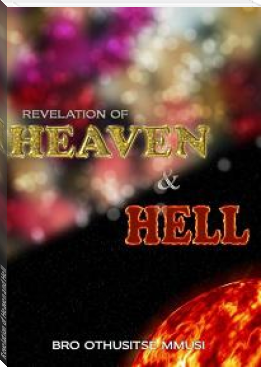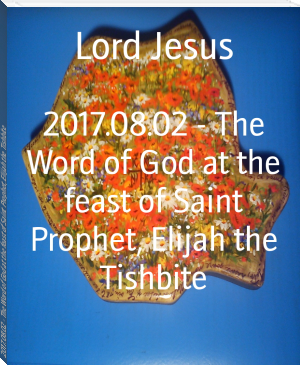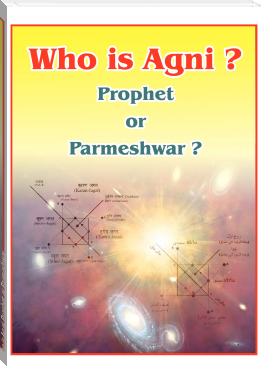Transition to Power by C. R. Oliver (best way to read ebooks txt) 📕

Read free book «Transition to Power by C. R. Oliver (best way to read ebooks txt) 📕» - read online or download for free at americanlibrarybooks.com
- Author: C. R. Oliver
Read book online «Transition to Power by C. R. Oliver (best way to read ebooks txt) 📕». Author - C. R. Oliver
Isaiah 49-50
Transition to Power
Introduction:
This is a transition chapter. Like Revelation 12, it could well stand alone and be read apart from the prophetic mainstream that flowed from the pen of Isaiah. Similarly, it, like Revelation 12, has elements of an "overview" of spiritual history as it relates to God's people. It is as if the prophet wanted his readers to have the "big picture."
Just as Isaiah was taken into the chambers of heaven to see the "Lord High and Lifted Up," this chapter pulls away the veil of time and shows Jesus as the center of all history. Within the gates of this section will be "glimpses of His regal stature" displayed in a fleeting manner--much like the Song of Solomon. I use the word, "glimpses," because of the structure of the chapter. Here, the author rapidly moves from one segment to another in displaying Jesus' glory. This is the reason I take license in gathering the passages into groupings (and pulling together references) that might not follow the chronology of the Biblical text.
Headings such as "Jesus, the prophet" or "Jesus, the High Priest" or "Jesus as King" are utilized for clarity.
Lastly, I composed a general summary to integrate the portions of Scripture which have not been covered in the groupings.
The goal of these changes is to enhance the reader's understanding of the power found in these verses (as they unfold in presenting Jesus to His covenant people)--several hundred years before His birth in Bethlehem.
Worthy of note is the fact that Jesus is portrayed in various roles. He shares a commonality with all who have presided as the prophet, priest and king before Him. Jesus is shown facing the same kind of opposition as the other true agents of God. In each of the groupings: prophet, priest, king there arises the notion that Jesus faced and excelled against the opposing propensities in each of His callings.
His fulfillment of those roles causes one to relate to Him through His manifold offices.
He encountered resistance to the messages of the prophet, along with the futility of speaking to a people with itching ears. A "renewed priesthood" is pictured through His role as "sacrificial-mediator" for the redemption of the world. He is viewed as a King; and because Kings conquer, He clearly is characterized in the magnitude of His conquering power. Nations and kings bow before Him and even kiss His feet in homage to His greatness.
Therefore, I find it helpful to divide the contents of this message along the lines of each role.
Jesus as prophet:
Because He came as a man and in the role of prophet, He experienced the frustration that all prophets encounter. Having no adherents, observing ears that truly do not listen, seeing no evidence of change because of their warnings and then out--right castigation by society at large are to name a few. Every prophet in the Old Testament faced the discouragement that seeks to attach itself to that office, but each of them overcame that darkness by the "Assurance of their Call." Though most of the time the prophet stands alone, his buoyancy is proven by his persistence and his disregard of the need for human approval.
God speaks and then the prophet speaks. This is the order of the office and is authority at its highest level. When God told Ezekiel, for instance, that He would make his forehead as hard as rock, the Lord knew what would be needed to fulfill his office. Ezekiel's adherence to his call--down to the letter--stands like a citadel in history.
Prophets have the unique position to be "situational watchmen," for "God does nothing that is not revealed through His prophets."
Theirs is not a "resign-able office."
Look at Jonah or Jeremiah as examples of those who could not walk away from their duties. Hear the words of any of the Old Testament "men sent from God," and you will see the golden thread of steadfastness and holiness that accompanied their work. One does not vocationally choose to be a prophet. Prophets are born with that "knowing."
As these passages unfold, difficulty arises over which passages refer to Isaiah and which refer to Jesus. Each served in the prophetic field. Both met the criteria of being "born into the job." Both experienced the "affront" which is associated with their anointing.
Isaiah 49:1-6
1 Listen to me, all of you in far-off lands: The Lord called me before my birth.From within the womb he called me by my name. 2 God will make my words of judgment sharp as swords. He has hidden me in the shadow of his hand; I am like a sharp arrow in his quiver.
3 He said to me: "You are my Servant, a Prince of Power with God, and you shall bring me glory."
4 I replied, "But my work for them seems all in vain; I have spent my strength for them without response. Yet I leave it all with God for my reward."
5 "And now," said the Lord--the Lord who formed me from my mother's womb to serve him, who commissioned me to restore to him his people Israel, who has given me the strength to perform this task and honored me for doing it!- 6 "you shall do more than restore Israel to me. I will make you a Light to the nations of the world to bring my salvation to them too."
TLB
Since I live in a "far off land," this prophecy is for me and those others who dwell in similar territories. Prophets know their message reaches farther than their locale. They know "the Word sent forth" will perform its duty. Earth shattering, time changing, power accompanies the spoken words of the prophet.
History hinges upon the minions of God's words. His words reform, transform and annihilate their target. They mean something. Whether spoken to an inanimate mountain or a crowd of religious "do nothings," once those words are cast into the atmosphere-things are never the same.
Pay attention to verse one, for both Isaiah and Jesus testify they were "called from the womb and endowed with the office of prophet." Both Isaiah and Jesus could testify,
God will make my words of judgment sharp as swords. He has hidden
me in the shadow of his hand; I am like a sharp arrow in his quiver.
A prophet is born a "weapon" in the arsenal of God.
Paul also declared the Word to be as sharp as a "two edged sword, dividing asunder the soul and the spirit." (O' this is what is missing today! Yes, how we long to hear the sovereign Word spoken in power from a Sovereign God through a sword wielding prophet! The scatter gun pronouncements, blaring from most of those assuming the office of prophet today, lack hearing anything from God)
He said to me: 'You are my Servant, a Prince of Power with God, and you shall bring Me glory.'
We must listen to the prophetic words from Princes--rather than those puny, pulchritudinous, passionless, imposters.
"Servant Prince" is a dimension of obedience that far surpasses the prophetic nominalism to which we are accustomed. True prophecy is an estate that reaches to heaven for its portion and has but one goal, "To Him be glory forever and ever."
Previously, in chapter forty-eight, great care was taken by the Lord to hide knowledge from those in ascribed power, lest they say, "I knew that." What the true prophet garners is that which man cannot glean from media or rationale. Research can never uncover the likes of what God sees.
Look now at the humility of both Isaiah and Jesus in the declaration every true prophet utters.
4 I replied, 'But my work for them seems all in vain; I have spent my strength for them without response. Yet I leave it all with God for my reward.'
Time will prove the true prophet's words because they will come to pass. The silence of a millennium makes no difference to him, for His words resound through timeless ages. They declare to "the princes of the power of the air" the truth of God. (They do what the prophetic church was designed to do, but is rarely adept at doing.)
Fulfillment is the litmus!
God and His word are inseparable and the guarantee of the true prophet is the assurance that what He has spoken will come to pass. The fulfillment starts in the commissioning and flows through that calling. Who could put out the fire in Jeremiah, when even he could not?
Revel now in the "packaging of a prophet."
5 "And now," said the Lord--the Lord who formed me from my mother's womb to serve him who commissioned me to restore to him his people Israel, who has given me the strength to perform this task and honored me for doing it!- 6 "you shall do more than restore Israel to me. I will make you a Light to the nations of the world to bring my salvation to them too."
TLB
Such terms, as the ones underlined, reveal the entity known as the "Seer." Formed, commissioned, strengthened and honored for one goal: "to be a light to the nations of the world to bring MY salvation to them too."
Jesus, who in His ministry, never ventured beyond Israel accomplished His task. He is the Light in darkness and He has opened the door so those dubbed "heathen," so they could come to God through Him.
Isaiah also accomplished his task, for no other prophet is quoted as much as he in the New Testament. Even in the book of Acts, one finds an Ethiopian reading from Isaiah's words. (O' the true church must have true prophets. The Body deserves to hear from those who meet these criteria.)
Jesus in the office of Priest:
Clearly, Jesus is presented as being the High Priest in this chapter. The duties of the Priest included offering sacrifice acceptable to God, mediating between God and man and entering into the Holiest in behalf of all the people. As viewed in these passages, the effective priest must also display a Shepherd's heart.
Isaiah 49:8
8 The Lord says, 'Your request has come at a favorable time. I will keep you from harm and give you as a token and pledge to Israel, proof that I will reestablish the land of Israel and reassign it to its own people again.'
Making a "request" for the whole of Israel is one man, Jesus!
What is the "request?" --That Israel be brought to Him? --That those in spiritual darkness be given Him? (Oh, I believe the "request" involved more than could be imagined. The "request" of a greater than Solomon, standing before God in the power of His glory, had to encompass more than the mind of ordinary men could comprehend! What would be the scope of the "request" from the Great High Priest for His people? How specific, and yet comprehensive, would be the prayer of Such An One? )
In His Priestly capacity, He is not acting as prophet, but is in the role of Mediator. "Re-establish" and "re-assign" are words that carry with them "re-creation and restoration." It is the answer God gave to the "request."
Could it be an end time prayer that His Covenant People be gathered around Him?
Observe this Priest as being Mediator and Shepherd in the words, "through You."
Isaiah 49:8-12
Through you I am saying to the prisoners of darkness, 'Come out! I am giving you your freedom!' They will be my sheep, grazing in green pastures and on the grassy hills. 10 They





Comments (0)